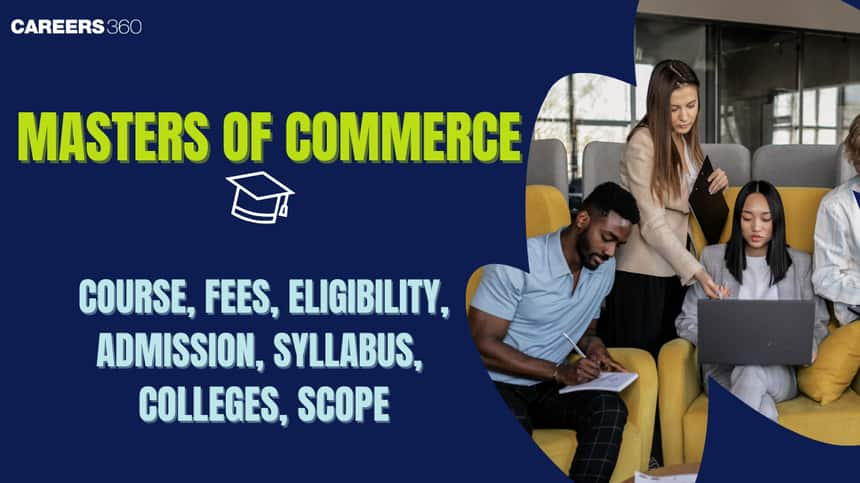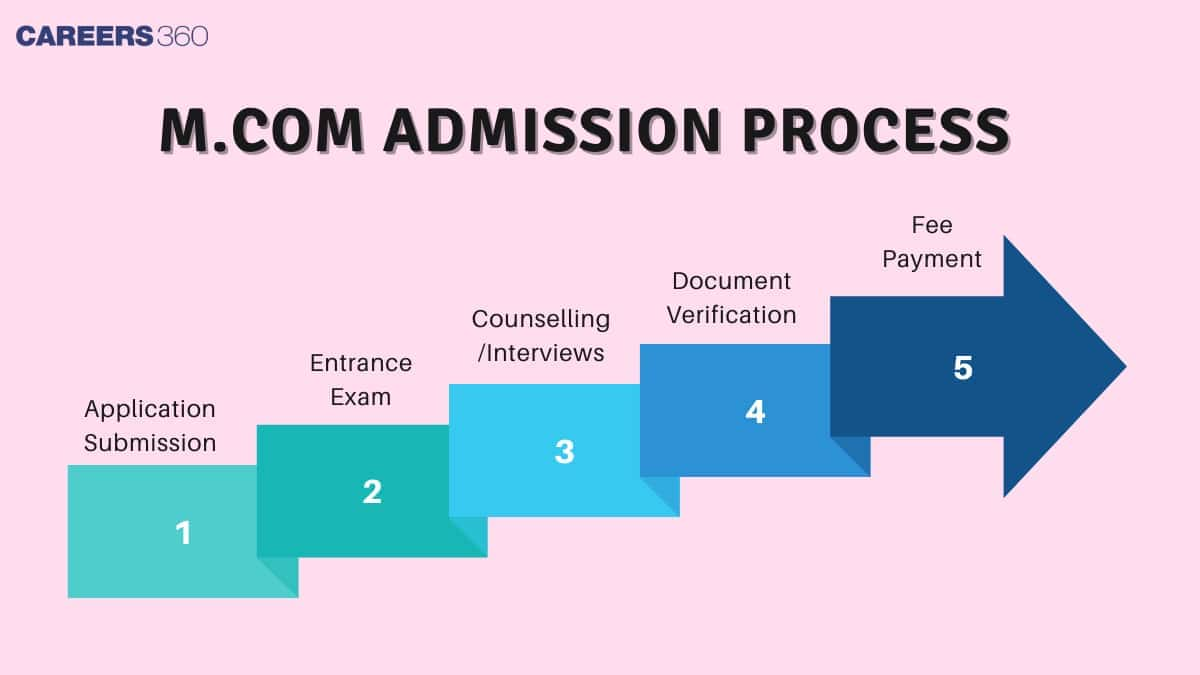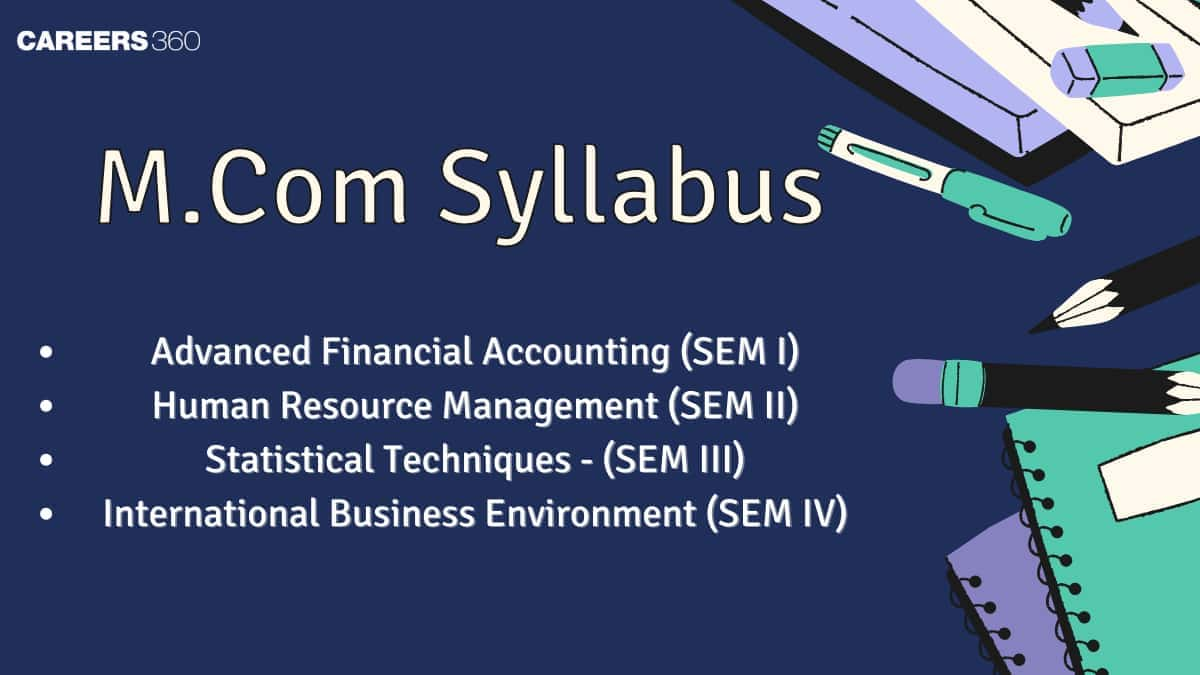University of Southampton Delhi Masters Admissions 2026
MSc Finance and MSc International Management Admissions 2026 Now Open | Ranked Among the Top 100 Universities in the World by QS World University Rankings 2025
The Master of Commerce (MCom) is a three-year postgraduate course divided into six semesters, focusing on accounting, finance, economics, business laws, marketing, and management. Important subjects include Organisation Theory, Statistical Analysis, Accounting, and International Business. To apply, students need a BCom or equivalent degree with 50–60 per cent marks. Admission is mainly through CUET PG, with exams like CPGET, APPGCET, and MAH CET also accepted. According to AISHE 2021–22, over 4,200 colleges offer MCom in India, including 3,088 private and 1,198 public institutions. Graduates can work in accounting, banking, insurance, company secretaryship, or teaching, with average salaries around Rs. 6 lakh per year.
This Story also Contains

M.Com full form is Master of Commerce, which is a postgraduate course in the field of commerce. Major candidates who complete graduation with B.Com proceed with M.Com. It is one of the most prominent courses for commerce background students.
The full form of MCom is Master of Commerce; it is a postgraduate course of two years' duration. It consists of four semesters. The MCom course provides advanced knowledge of accounting, finance, marketing, and management domains. Below are the key highlights of the MCom course:
| Particulars | Values |
|---|---|
Course Name | MCom |
MCom Course Level | Postgraduate |
MCom Full Form | Master of Commerce |
MCom Course Duration | 2 Years |
MCom Eligibility Criteria | Candidates are required to have 50 per cent in B.Com from a recognised university. |
MCom Admission Process | Based on the entrance exam/merit-based |
MCom Entrance Examinations | CUET PG, CPGET, APPGCET |
MCom Average Fees | Rs. 4,920 to Rs. 4.59 Lakhs |
MCom Average Salary | Rs. 5 LPA |
MCom Job Profiles | Chartered Accountant, Company Secretary, Insurance and Banking services. |
MCom Top Colleges | Calicut University, UNIRAJ, Gujarat University, Lucknow University, Kerala University, and DU SOL |
MCom or Master of Commerce is a postgraduate course of two years' duration. The course provides knowledge of finance, economics, business laws, and commerce disciplines. To be eligible for the course, students must hold a BCom or a bachelor's degree in any discipline. They must also achieve an aggregate score of 50-60 per cent, depending on the provider.
Enrolling in an MCom programme offers numerous advantages for students interested in commerce and finance. It helps develop advanced knowledge in accounting, finance, economics, and management while improving career prospects. Below are some of the key benefits of pursuing an MCom degree.
Students interested in pursuing an MCom course should meet the eligibility requirements. Eligibility requirements differ depending on the institute. However, it remains more or less the same for every institute. In the table below, we have mentioned the general MCom eligibility criteria.
| Particulars | Eligibility Parameters |
|---|---|
Educational Qualification | B.Com or Bachelor's degree from a recognised institute in India |
Minimum aggregate score | 50-60 per cent aggregate score, 5-10 per cent relaxation for candidates belonging to the reserved categories |
| Entrance Exam | CUET PG, CPGET, and University Specific |
The admission process for MCom may vary slightly across colleges and universities, but the overall procedure remains quite similar. Most institutes consider the merit of the BCom or equivalent degree, while some also conduct entrance exams. Below are the steps for the admission process:
Step 1 – Check Eligibility: Before applying, candidates must ensure they meet the eligibility criteria, including a BCom or relevant bachelor’s degree from a recognised university.
Step 2 – Application Form: After confirming eligibility, students need to fill out the online application form on the college/university website and upload the required documents along with the application fee. Some institutes also accept a printed form sent by post.
Step 3 – Entrance Exams: Certain universities conduct entrance tests for MCom admissions. Candidates must clear the respective test to be considered for selection.
Step 4 – Counselling/Interview: Based on the merit of the qualifying exam or entrance test, shortlisted candidates are invited for counselling or personal interviews.
Step 5 – Final Admission: Selected candidates must complete the admission process by submitting the necessary documents, verifying credentials, and paying the course fees.

Admission to the M.Com course in the distance mode is offered based on the merit of the qualifying examination, and there is no entrance exam conducted for admission by the colleges offering this course. IGNOU is one of the universities offering distance education in M.Com. The detailed M.Com Distance Admission procedure is given below:
Step 1 – Check Eligibility: Candidates must ensure they meet the eligibility criteria, usually a BCom or equivalent degree from a recognised university.
Step 2 – Application Form: Fill out the online application form available on the university’s website and submit it along with the required documents.
Step 3 – Merit-Based Selection: Admission is granted based on the marks obtained in the qualifying examination. Eligible candidates are offered admission after document verification.
Step 4 – Fee Payment: The final step is to pay the course fees. Admission is confirmed once the payment is successfully made.
Admission to MCom programmes in India is generally based on merit or entrance tests conducted by universities and colleges. These exams evaluate candidates’ knowledge in commerce, finance, accounting, and economics. Clearing the required test is essential for admission. Below is a list of some of the top colleges offering MCom courses.
| Exam Name | Conducting Body | Exam Schedule |
|---|---|---|
National Testing Agency (NTA) | ||
Osmania University |
Students pursuing MCom can select specialisations based on their career goals and areas of interest, such as accounting, finance, taxation, banking, and international business. Choosing the right specialisation helps enhance skills and opens opportunities in both industry and academia. Some of the popular MCom specialisations one can opt for are listed below:
MSc Finance and MSc International Management Admissions 2026 Now Open | Ranked Among the Top 100 Universities in the World by QS World University Rankings 2025
India's Largest University | NAAC A++ | 100% Placements Record | Highest CTC 2.5 Cr PA | 150 + Programmes across Multiple Disciplines
Students can study an MCom in a variety of modes, depending on the preference and convenience of the candidate. While a full-time MCom is the most popular mode, candidates can also choose online MCom, Distance MCom, or part-time MCom. Listed below are the details of the MCom course:
| Courses Types | Details |
|---|---|
Full-Time MCom |
|
Part-Time MCom |
|
Online MCom |
|
After completing a MCom two-year degree course, students get an academic degree from the respective university, which is designated as a Master of Commerce.
In-depth Knowledge: Pursuing an MCom provides an advanced understanding of commerce, finance, accounting, economics, and business management. Students gain deeper insights into subjects studied at the undergraduate level, preparing them for specialised roles in the industry or research.
Wider Career Opportunities: An MCom graduate has diverse career options in accounting, banking, finance, taxation, insurance, and the corporate sectors. The degree enhances employability and opens pathways to managerial and analytical roles.
Further Studies: Candidates aiming for a PhD or academic career often pursue an MCom to gain research skills and specialised knowledge, making it a strong foundation for teaching and research positions.
The MCom curriculum prepares students with essential skills and knowledge for careers in commerce, finance, accounting, and economics. It combines theoretical learning with practical applications to prepare graduates for industry and academia. Below, we have provided the MCom syllabus for reference:

In the first year of MCom, students gain knowledge in advanced accounting, cost accounting, managerial economics, and human resource management. They also study the Indian financial system, cooperation, and research methodology to build a strong foundation in commerce and finance.
| Semester 1 | Semester 2 |
|---|---|
Advanced Financial Accounting | Research Methodology |
Indian Financial System | Advanced Cost Accounting |
Managerial Economics | Cooperation |
- | Human Resource Management |
In the second year of MCom, students focus on advanced subjects like management accounting, statistical techniques, and the international business environment. The course also includes project work or a thesis, allowing students to apply their learning in practical scenarios.
| Semester 3 | Semester 4 |
|---|---|
Core Group | Core Group |
Advanced Management Accounting | International Business Environment |
Statistical Techniques | Project |
MCom graduates have a wide range of career opportunities in finance, banking, corporate, and accounting sectors. The salary offered varies depending on experience, skills, qualifications, and industry demand. Below are some of the job roles, along with their average salaries, that MCom graduates can explore across sectors:
Job Role | Job Description | Average Salary (LPA) |
|---|---|---|
Operations managers oversee the daily activities and processes of organisations, ensuring efficiency and productivity. They coordinate teams, manage resources, and implement strategies to meet business goals. | Rs. 11.1 LPA | |
Investment bankers assist companies with raising capital, mergers, and acquisitions. They analyse financial data and advise clients on investment opportunities and market trends. | Rs. 21.9 LPA | |
Marketing managers plan and execute marketing campaigns to promote products or services. They study market trends, manage budgets, and lead teams to achieve business growth. | Rs. 13.1 LPA | |
Accountants manage financial records, prepare statements, and ensure compliance with regulations. They analyse financial data to support decision-making and maintain organisational financial health. | Rs. 3.4 LPA | |
Business analysts evaluate business processes, identify improvement areas, and propose solutions. They work with teams to enhance efficiency and achieve organisational objectives. | Rs. 9.8 LPA |
Salary Source: AmbitionBox
Studying an MCom course improves knowledge in accounting, finance, economics, and management, preparing students for diverse career paths. It also improves analytical and research skills, increases employability, and opens opportunities in banking, corporate sectors, taxation, and academia. The degree also provides a strong foundation for higher studies and professional certifications.
After completing MCom, graduates can choose from a wide range of career-oriented courses. These courses can provide the students with job-specific skills and increase their employability. Listed below are some of the courses available after MCom.
In India, various private colleges offer MCom in various specialisations. Private colleges are generally expensive compared to government institutions. In the table below, we have provided some of the popular MCom colleges, along with their respective fee details.
| Top Colleges | Fees |
|---|---|
Rs. 1.50 Lakhs | |
Rs. 13,580 | |
Rs. 60,000 | |
Rs. 28,000 | |
- | |
Rs. 80,320 | |
Rs. 44,000 | |
Rs. 26,000 | |
Rs. 1.32 Lakhs |
Government colleges are known for their quality education and nominal fees. Students interested in studying MCom from a government institute in India should meet the eligibility criteria. In the table below, we have mentioned the MCom colleges in India, along with their fees.
| Top Colleges | Fees |
|---|---|
Rs. 9,950 | |
Rs. 84,000 | |
Rs. 10,000 | |
Rs. 9,780 | |
- | |
- | |
- | |
- |
Online education has become very important in recent years. Various private colleges offer online MCom courses in India. In the table below, we have mentioned the top online MCom colleges, along with their fee structure.
| Top Colleges | Fees |
|---|---|
Rs. 33,000 | |
Rs. 36,000 | |
Rs. 40,000 | |
Rs. 43,400 | |
Rs. 98,800 |
To conclude, MCom is a popular course that provides students with diverse career options and high-earning potential. To be eligible for the course, students must meet the eligibility criteria and follow the admission procedure.
Frequently Asked Questions (FAQs)
Candidates are required to submit their application online at the college or university’s website. Eligible candidates will be shortlisted based on their merit or entrance test exam.
After the two-year degree, candidates can opt for professions like Chartered Accountancy (CA), Company Secretary (CS), Cost and Work Accountancy (CWA), Insurance & Banking services.
The top colleges for M.Com are Shri Ram College of Commerce, Hansraj College, St. Joseph College, Stella Maris College for Women, St. Xavier's College, Sri Guru Gobind Singh College.
Some of the popular MCom specialisations are Finance, Computer Applications, Accounting, Taxation, and Human Resource Management.
International financial management, deals with cross border investment decisions, financing decisions, working capital management. It also deals with international diversification and portfolio investment and international tax environment and international accounting.
There is a good scope in academics after studying M.Com. Candidates need to appear for the UGC NET/JRF exam. Based on their UGC score candidates will get NET or both NET and JRF. After clearing the UGC NET/JRF, candidates are eligible for lectureship at colleges or they can join for the Ph.D.
The Business Analyst, analyze the market, product lines, and the overall profitability of the business. They analyze the problems and look for a suitable solution.
Accountant takes care of the finance-related matter of the organisations or institutes. He keeps the record of the expenses that occur throughout the year with the help of accounting software. He also makes the organisations aware of the existing fund and future expenses. An accountant prepares and distributes cheques, and manages record-keeping work at banks and account departments of various organisations.
Investment Banker helps clients to raise money in the capital market and issue debt or sell their equity in the companies.
Salary package will be between 2 to 5 LPA, depending on the skills of the candidates.
On Question asked by student community
you can get the question papers in the official university website under the Examinations/Previous year question paper section.
Hello
Yes, it's possible to do an MCom after a BBA. Most universities allow students who have completed a BBA to pursue a Master of Commerce, as there is a significant overlap in subjects like accounting, finance, and economics. To be eligible, you will likely need to meet the university's
If you took admission in MCom at MDU in 2024 but did not continue by skipping exams, your name may have been removed from the university rolls as per MDU rules. Typically, MDU allows re-admission once if a student applies within a stipulated time, pays the re-admission fee, and meets
Hello,
You cannot directly transfer your M.Com admission from IGNOU to Jain University. IGNOU and Jain University follow different systems, so credit transfer between them is usually not allowed.
If you want to study at Jain University, you will need to take fresh admission there. You can, however, check with
Hi dear candidate,
On our official website, you can find the Delhi University master's in commerce (MCom) entrance exam question papers in PDF format.
To download them, visit the link given below:
DU M.com Entrance Question Paper 2021 - Download Previous Year Paper PDF
BEST REGARDS
Among top 100 Universities Globally in the Times Higher Education (THE) Interdisciplinary Science Rankings 2026
Among top 100 Universities Globally in the Times Higher Education (THE) Interdisciplinary Science Rankings 2026
Ranked #45 Among Universities in India by NIRF | 1950+ Students Placed 91% Placement, 800+ Recruiters
NAAC A+ Accredited | Among top 2% Universities Globally (QS World University Rankings 2026)
B.Sc (Hons) Admissions 2026 Now Open | Ranked Among the Top 100 Universities in the World by QS World University Rankings 2025
India's youngest NAAC A++ accredited University | NIRF rank band 151-200 | 2200 Recruiters | 45.98 Lakhs Highest Package